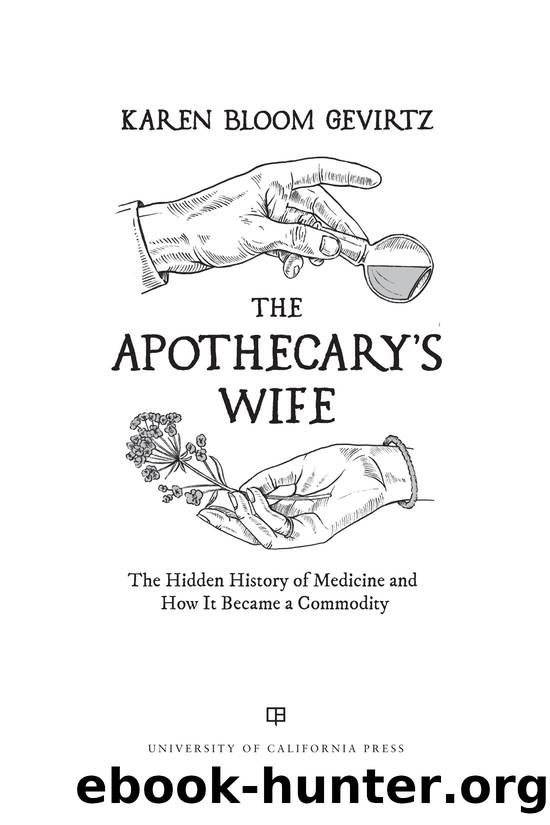The Apothecary's Wife by Karen Bloom Gevirtz;

Author:Karen Bloom Gevirtz;
Language: eng
Format: epub
ISBN: 9780520409910
Publisher: University of California Press
Published: 2024-09-09T00:00:00+00:00
If these Gentlemen had not made so great a noise about the Poor, and shewn such great industry in inviting to buy their Panaceas, one might have believed something of their Generosity. But Mankind now adays [sic] are not so immoderately desirous to serve one another, much less those that have most need.
6
The Laboratory on Cheesewell Street
It is the early eighteenth century, you are passionately dedicated to the Scientific Revolution, and the dead elephant that you purchased has been delivered to your front lawn. You wanted to know all about elephants, but now that the thing is right there in front of you, you are having second thoughts. Dissecting an elephant may not be a one-man job after all. Also, your wife is furious. If you are Hans Sloane and this is London, the solution is obvious. You need James Douglas, the premier anatomist of the day. Besides, he has dissected a flamingo; the manâs unshakeable.* Off goes a gracious invitation to your colleague to share in your good fortune. Unfortunately, James Douglas is no fool and he has anticipated you, stopping by to view the rotting pachyderm when you are not home just in case you extended this very invitation. The elephantâs âenormous bulk quite frightens me from medling with its dissection,â he replies. Sorry.
Douglas was not just the best anatomist of the early eighteenth century. He was also a leading obstetrician and a profoundly curious, deeply committed contributor to the Scientific Revolution. As soon as he earned his medical degree from the University of Rheims in 1699, he joined the corps of physicians at the leading edge of the revolution. He returned to London to practise obstetrics with the famous Chamberlen family, whose interest in tools and technology for enhancing human ability had led to their famous, secret obstetrical instrument, the forceps. Douglas took stunningly detailed case notes and, whenever possible, performed post-mortems. He shared his expertise through papers at the Royal Society, publications, and correspondence with other researchers around Europe, as well as training and mentoring young physicians. He was one of the first to give anatomy lectures out of his home to educate the paying public. The Company of Barber-Surgeons awarded him the Gale Osteology Lectureship for 1712 and the Arris Muscular Lectureship in 1716 to teach the apprentices. As Helen Brock, one of his twentieth-century biographers, understatedly put it, Douglas was a âworthy inheritor of the new approach to science and medicine, all his work being characterized by careful observation and the testing of traditional beliefs against new discoveriesâ. He was the very model of a scientific revolutionary.
When he became interested in medication, he sought an expert in chemistry for help. Chemistry was in the process of evolving from alchemy, roughly defined as the belief and practice that every substance in the cosmos could be manipulated until it yielded the pure element or elements at its heart. Alchemy gave the emerging science the ideas that substances can be reduced to their component parts and that breaking down and recombining substances can yield an improved product.
Download
This site does not store any files on its server. We only index and link to content provided by other sites. Please contact the content providers to delete copyright contents if any and email us, we'll remove relevant links or contents immediately.
| Administration & Medicine Economics | Allied Health Professions |
| Basic Sciences | Dentistry |
| History | Medical Informatics |
| Medicine | Nursing |
| Pharmacology | Psychology |
| Research | Veterinary Medicine |
The Immortal Life of Henrietta Lacks by Rebecca Skloot(4576)
An American Plague by Jim Murphy(3760)
The Emperor of All Maladies: A Biography of Cancer by Siddhartha Mukherjee(3148)
The Gene: An Intimate History by Siddhartha Mukherjee(3094)
The Fate of Rome: Climate, Disease, and the End of an Empire (The Princeton History of the Ancient World) by Kyle Harper(3055)
Rebecca Skloot by The Immortal Life of Henrietta Lacks(2007)
Stiff - The Curious Lives of Human Cadavers by Mary Roach(1852)
The Great Influenza by John M Barry(1783)
The Vaccine Race by Meredith Wadman(1653)
Hero by Michael Grant(1643)
Undue Risk by Moreno Jonathan D.;(1620)
Three Cups of Tea by Greg Mortenson(1613)
The Mystery of the Exploding Teeth by Thomas Morris(1566)
Quackery by Lydia Kang(1550)
Autism's False Prophets by Paul A. Offit(1535)
Extremes: Life, Death and the Limits of the Human Body by Fong Kevin(1519)
Steroids: History, Science, and Issues by Standora Joan E.; Bogomolnik Alex; Slugocki Malgorzata(1519)
A Journal of the Plague Year (Oxford World's Classics) by Daniel Defoe(1518)
The Vaccine Court by Rohde Wayne(1508)
